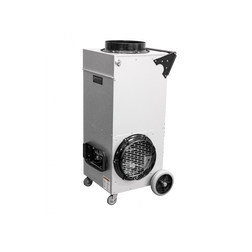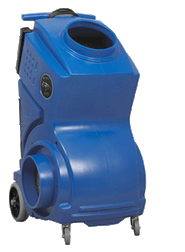Abatement Portable Air Scrubbers and high-efficiency HEPA filters can potentially save users up to $10,000 or more over the life of the unit compared to other systems, including low-priced (and generally low-quality) “economy” products. Four main factors contribute to these savings:
1) Longer filter life because the filters provide exceptional dirt-holding capacity
2) Lower replacement filter costs
3) Lower labor costs due to higher productivity
4) Minimal downtime. By any measure, this is an excellent return on investment.
What does the term HEPA mean?
HEPA is an acronym for "High Efficiency Particulate Air" or "High Efficiency Particulate Arrestance." This acronym refers to a filter that is manufactured, tested and certified to meet Institute of Environmental Sciences and Technology (IEST) construction, performance and certification standards as currently published in IEST RP-CC001.3.
What is it that makes HEPA filters so efficient?
The ultra-fine, glass-fiber medium captures microscopic particles that can easily pass through other filters by a combination of diffusion, interception and inertial impaction. To qualify as a Type A HEPA filter, the filter must capture at least 99.97% (9,997 out of 10,000) of particles 0.3 microns in size–about 300 times smaller than the diameter of a human hair, and 25 to 50 times smaller than we can see. To a HEPA filter, catching a one-micron particle (1/1,000,000 of a meter) is like stopping a cotton ball with a door screen.
Does HEPA filter efficiency decrease as the filter gets dirty?
No. Unlike electronic air cleaners and other air purification technologies that experience substantial loss of efficiency as they become dirty, exactly the opposite typically happens with HEPA filters. In fact, the dirtier a HEPA filter gets, the more efficient it can become.
















